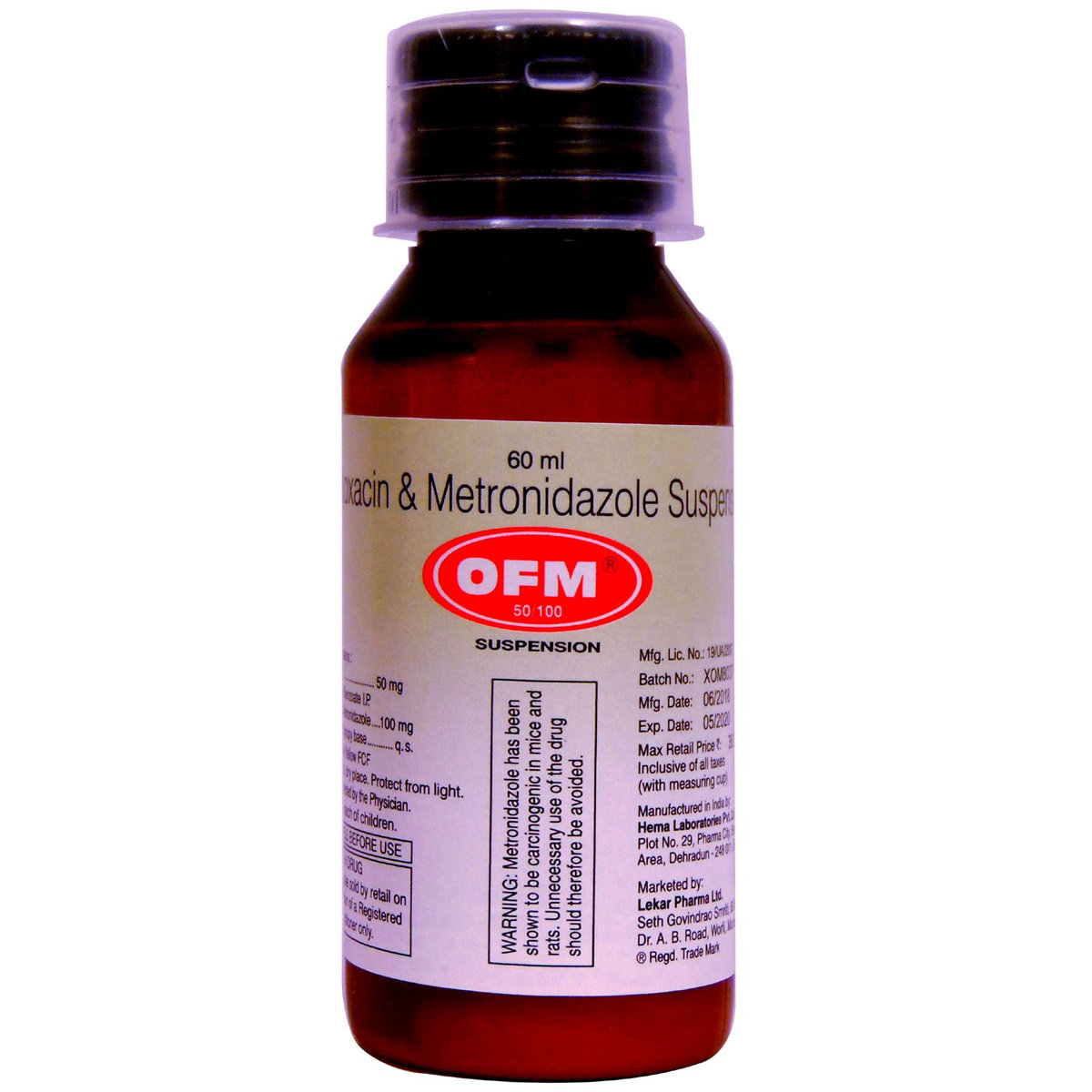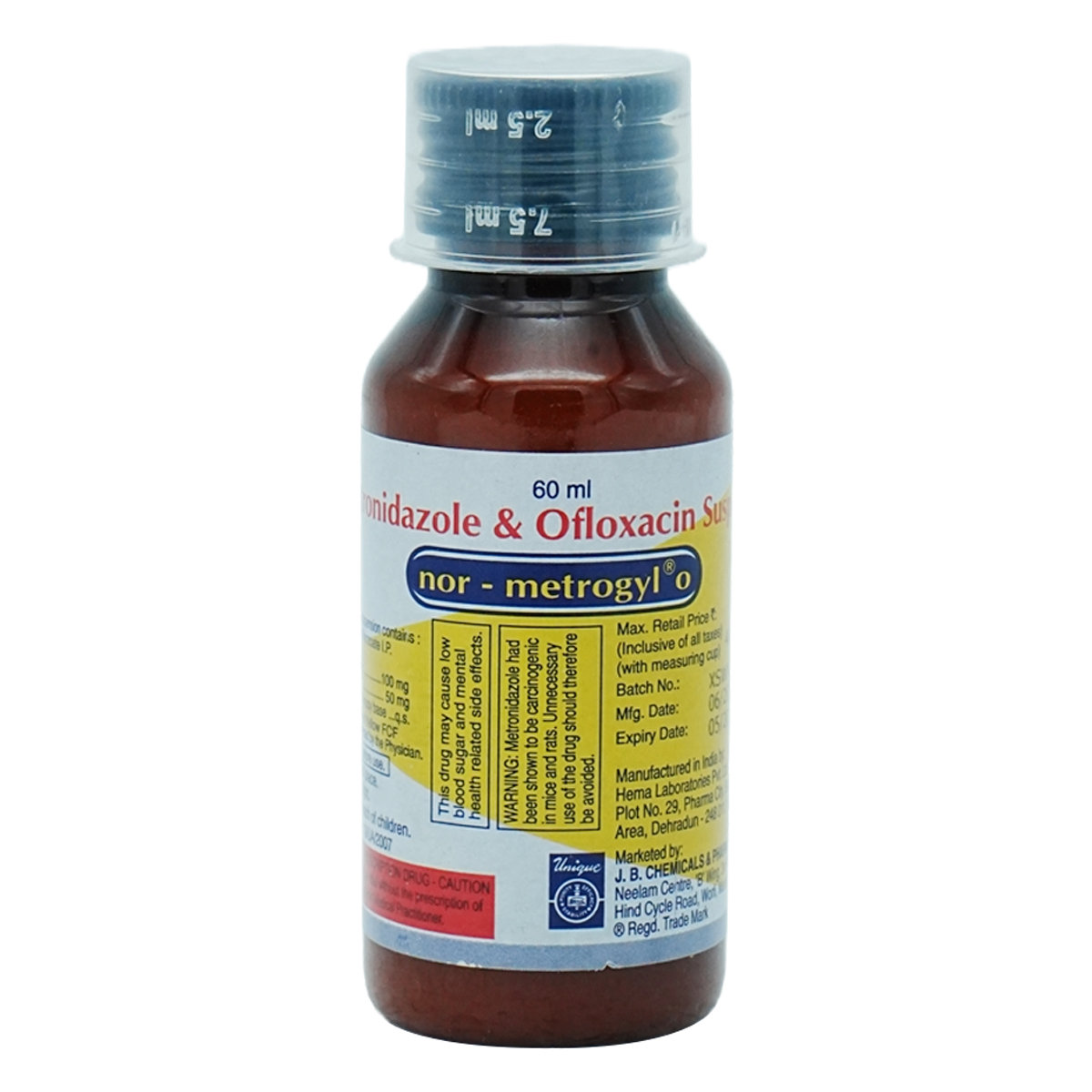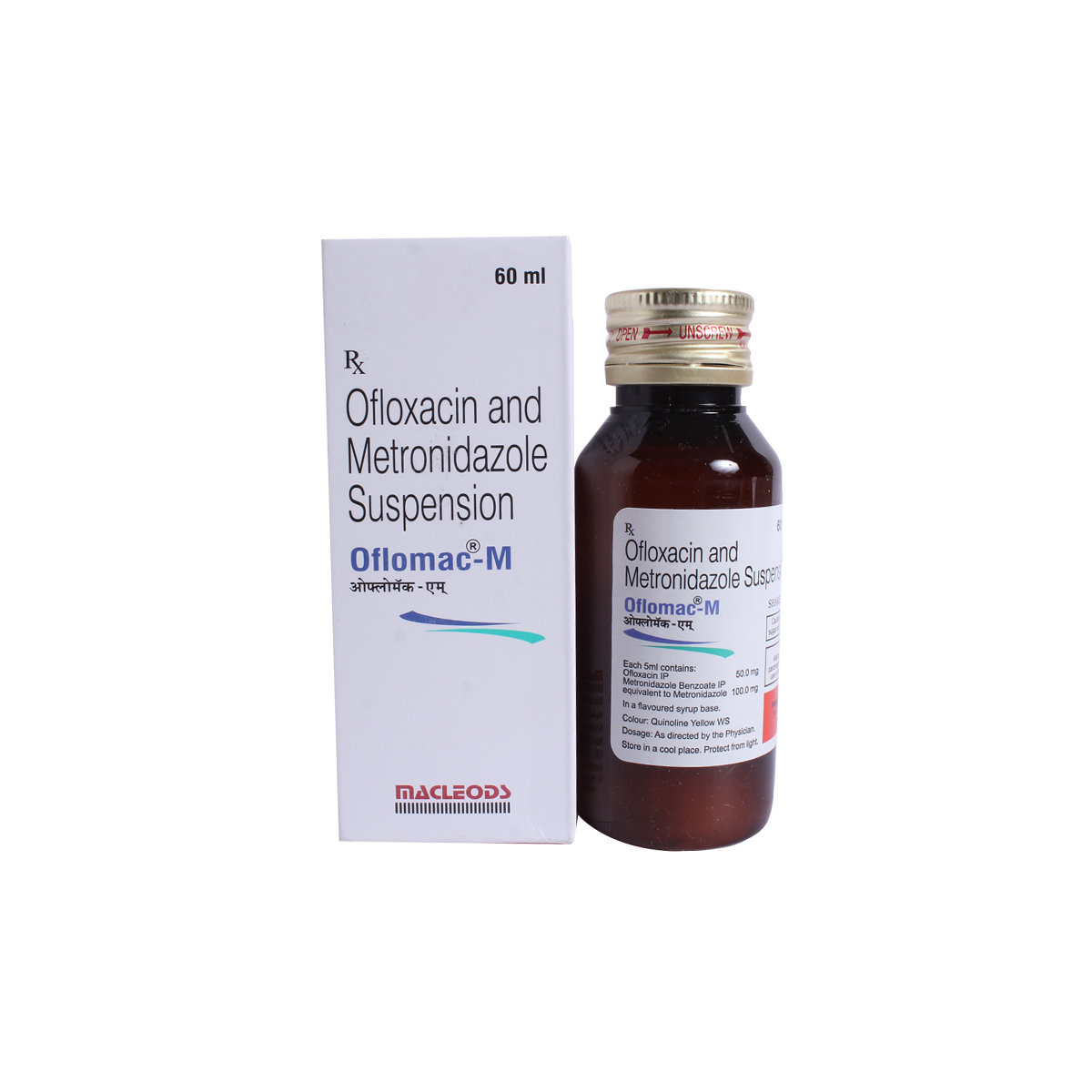Kidogyl Suspension 60 ml
MRP ₹45
(Inclusive of all Taxes)
₹6.8 Cashback (15%)
Provide Delivery Location
Online payment accepted
 Prescription drug
Prescription drugWhats That
Composition :
Manufacturer/Marketer :
Consume Type :
Expires on or after :
Return Policy :
About Kidogyl Suspension
Kidogyl Suspension is a combination of antibacterial (ofloxacin) and anti-amoebic (metronidazole) used to treat various infections caused by bacteria and dysentery caused due to amoeba. A bacterial infection is a condition in which harmful bacteria enter, multiply, and infect our bodies. It can target any body part and multiple very quickly. Amoebic dysentery can be caused due to Entamoeba histolytica, Giardia lamblia, or Clostridium difficile.
Kidogyl Suspension is a combination of two antibiotics that include Ofloxacin and Metronidazole. Ofloxacin prevents the division of bacterial cells. It also inhibits the repairing of bacterial cells. Both these actions lead to the killing of the bacteria. Metronidazole kills parasites and anaerobic bacteria that are responsible for causing infections. It works by damaging their DNA. Both are bactericidal in nature, and collectively they help in treating the disease effectively.
Take Kidogyl Suspension as prescribed. Your doctor will recommend how often you take Kidogyl Suspension based on your medical condition. In some cases, you may experience nausea, vomiting, upset of stomach, loss of appetite, dry mouth, and metallic taste. Metronidazole can also cause headache, dizziness, drowsiness, and confusion. Most of these side effects of Kidogyl Suspension do not require medical attention and gradually resolve over time. However, if the side effects are persistent, reach out to your doctor. If you experience any allergic reaction symptoms such as rashes, itching, swelling, shortness of breath, etc., please consult your doctor immediately.
It is not advisable to stop taking Kidogyl Suspension suddenly to avoid unpleasant side effects. The full course prescribed by the doctor should be completed. Inform your doctor if you have any lung disease, epilepsy, sleeping disorder, or difficulty sleeping (sleep apnoea), severe liver disease, or problem with alcohol or other prescription recreational drugs. Kidogyl Suspension should not be used by the pregnant women (especially during the first trimester), breastfeeding mother and patients with liver diseases, low blood white cells (leukopenia), seizures (fits), gastro intestine diseases (like Crohn's disease, Inflammatory bowel disease etc.) and other neurological related diseases. Do not drive or operate heavy machinery as it can lower your mental alertness and cause dizziness.
Uses of Kidogyl Suspension
Directions for Use
Key Benefits
Kidogyl Suspension is a combination of two antibiotics that include Ofloxacin and Metronidazole. Ofloxacin prevents the division of bacterial cells. It also inhibits the repairing of bacterial cells. Both these actions lead to the killing of the bacteria. Metronidazole kills parasites and bacteria that are responsible for causing infections. It works by damaging their DNA. Both are bactericidal in nature.
Storage
Drug Warnings
If you are allergic to ofloxacin, metronidazole, or any other antibacterial or anti-amoebic agents, please inform your doctor to avoid any unwanted side effects like swallowing or breathing problems, swelling of your lips, face, throat, or tongue. Taking Kidogyl Suspension may increase the chances of developing tendinitis (swelling of a tissue that joins a bone to a muscle) or a tendon rupture. Dairy products should be avoided along with Kidogyl Suspension. And also, exposure to sunlight should be avoided while taking Kidogyl Suspension as it may cause increased phototoxicity or photosensitivity. Patients with an irregular heartbeat (QT prolongation) should tell their doctor before taking Kidogyl Suspension. Some medicines like pain killers (ibuprofen or diclofenac,) anti-asthma (theophylline), anti-diabetic (glibenclamide), anti-gout (probenecid), anti-cancer (5-fluorouracil), antidepressant (lithium), antiepileptic (phenobarbital, phenytoin), blood thinner (warfarin) should not be taken with Kidogyl Suspension to avoid worsening of the condition. Kidogyl Suspension should not be given to the pregnant mother (during the first trimester) and in nursing mothers as it passes into the breast milk. Please inform you, doctor, before taking Kidogyl Suspension if you have a history of problems with your liver, blood, low white blood cell count (leukopenia), nervous system (convulsions). Do not drink alcohol with Kidogyl Suspension as it may cause flushing and drowsiness which can alter your mental alertness.
Diet & Lifestyle Advise
- Do not drink or eat a lot of caffeine-containing products such as coffee, tea, energy drinks, cola, or chocolate. Kidogyl Suspension may increase nervousness, sleeplessness, and anxiety caused by caffeine.
- Probiotics should be taken after taking the full course of Kidogyl Suspension in order to restore some healthy bacteria in the intestines that may have been killed. Taking probiotics after antibiotic treatment can reduce the risk of antibiotic-associated diarrhea. Certain fermented foods like yogurt, cheese, sauerkraut, kombucha, and kimchi can help restore the intestine's good bacteria.
- Include more fiber-enriched food in your diet, as it can be easily digested by your gut bacteria, which helps stimulate their growth. Thus, fiber-rich foods may help restore healthy gut bacteria after a course of antibiotics. Whole grains like whole-grain bread, brown rice should be included in your diet. Make sure you drink plenty of water or other fluids every day while you are taking Kidogyl Suspension.
- Avoid intake of alcoholic beverages with Kidogyl Suspension as it can make you dehydrated and may affect your sleep. This can make it harder for your body to aid the Kidogyl Suspension in fighting off infections.
Side Effects of Kidogyl Suspension
- Nausea
- Vomiting
- Upset stomach
- Loss of appetite
- Dry mouth
- Metallic taste
- Headache
Habit Forming
Therapeutic Class
All Substitutes & Brand Comparisons
RX
Out of StockBactivid M Suspension
Cadex Laboratories
₹36
(₹0.65/ 1ml)
4% CHEAPERRX
Out of StockBetflox M Oral Suspension
₹43
(₹0.65/ 1ml)
4% CHEAPERRX
Out of StockDealflox MZ Oral Suspension
₹47
(₹0.71/ 1ml)
4% COSTLIER
FAQs
Drug-Drug Interactions Checker List
- IBUPROFEN
- DICLOFENAC
- THEOPHYLLINE
- GLIBENCLAMIDE
- PROBENECID
- LITHIUM
- PHENOBARBITAL
- PHENYTOIN
- WARFARIN
Special Advise
You should consult a doctor if you have symptoms associated with dehydration like dry mouth, excessive thirst, wrinkled skin, little or no urination, dizziness and lightheadedness.
Disease/Condition Glossary
Bacterial Infection: A bacterial infection is a condition in which harmful bacteria enter, multiply, and infect our body. It can target any body part and multiple very quickly. When you get infected with bacteria, you can experience generalized symptoms, like fevers, chills, and fatigue. Bacteria are of various forms comprising commonly of spherical, rod, and spiral-shaped. Bacterial infections vary from minor illnesses like sore throat and ear infections to severe brain infections like meningitis and encephalitis. Few harmful bacteria that cause infections include Streptococcus, Staphylococcus, and E. coli. Anyone can become infected with a bacterial infection. People with weak immune systems or taking immunosuppressive medicine can make them more prone to bacterial infection.
Diarrhoea: It is the increase in bowel movement leading to increased and loose motions.
Dysentery: It is inflammation of the intestine, particularly the colon, caused by the bacteria Shigella.

Have a query?
Alcohol
Safe if prescribed
Alcohol should not be consumed while taking Kidogyl Suspension to avoid unpleasant side-effects like flushing, lightheadedness, dizzy and drowsy.
Pregnancy
Consult your doctor
Kidogyl Suspension should not be taken if you are pregnant or planning to have a baby. If you become pregnant while taking Kidogyl Suspension, stop taking the medication, and contact your doctor immediately. Metronidazole should not be given in the first trimester of the pregnancy as it may cause harm to the fetus.
Breast Feeding
Consult your doctor
Kidogyl Suspension passes in the breast milk so the nursing mother should avoid taking Kidogyl Suspension.
Driving
Safe if prescribed
Kidogyl Suspension can cause dizziness in some patients. If you feel dizzy, please do not operate the car.
Liver
Consult your doctor
Kidogyl Suspension to be taken with caution, especially if you have a history of Liver diseases/conditions. The dose may have to be adjusted by your doctor.
Kidney
Consult your doctor
Kidogyl Suspension to be taken with caution, especially if you have a history of Kidney diseases/conditions. The dose may have to be adjusted by your doctor.
Children
Safe if prescribed
Kidogyl Suspension can be given to the children for typhoid fever, diarrhoea, stomach infection, amoebiasis, abdominal infection, diarrhoea and intestinal infection.











